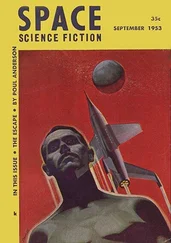As he ate, Joe nodded at the book and said, “That Abendsen lives around here, according to the cover. In Cheyenne. Gets perspective on the world from such a safe spot, wouldn’t you guess? Read what it ways; read it aloud.”
Taking the book, she read the back part of the jacket. “He’s an ex-service man. He was in the U. S. Marine Corps in World War Two, wounded in England by a Nazi Tiger tank. A sergeant. It says he’s got practically a fortress that he writes in, guns all over the place.” Setting the book down, she said, “And it doesn’t say so here, but I heard someone say that he’s almost a sort of paranoid; charged barbed wire around the place, and it’s set in the mountains. Hard to get to.”
“Maybe he’s right,” Joe said, “to live like that, after writing that book. The German bigwigs hit the roof when they read it.”
“He was living that way before; he wrote the book there. His place is called—” She glanced at the book jacket. “The High Castle. That’s his pet name for it.”
“They won’t get him,” Joe said, chewing rapidly. “He’s on the lookout. Smart.”
She said, “I believe he’s got a lot of courage to write that book. If the Axis had lost the war, we’d be able to say and write anything we wanted, like we used to; we’d be one country and we’d have a fair legal system, the same one for all of us.”
To her surprise, he nodded reasonably to that.
“I don’t understand you,” she said. “What do you believe? What is it you want? You defend those monsters, those freaks who slaughtered the Jews, and then you—” Despairing, she caught hold of him by the ears; he blinked in surprise and pain as she rose to her feet, tugging him up with her.
They faced each other, wheezing, neither able to speak.
“Let me finish this meal you fixed for me,” Joe said at last.
“Won’t you say? You won’t tell me? You do know what it is, yourself; you understand and you just go on eating, pretending you don’t have any idea what I mean.” She let go of his ears; they had been twisted until they were now bright red.
“Empty talk,” Joe said. “It doesn’t matter. Like the radio, what you said of it. You know the old brownshirt term for people who spin philosophy? Eierkopf . Egghead. Because the big double-domed empty heads break so easily… in the street brawls.”
“If you feel like that about me,” Juliana said, “why don’t you go on? What are you staying here for?”
His enigmatic grimace chilled her.
I wish I had never let him come with me, she thought. And now it’s too late; I know I can’t get rid of him—he’s too strong.
Something terrible is happening, she thought. Coming out of him. And I seem to be helping it.
“What’s the matter?” He reached out, chucked her beneath the chin, stroked her neck, put his fingers under her shirt and pressed her shoulders affectionately. “A mood. Your problem—I’ll analyze you free.”
“They’ll call you a Jew analyst.” She smiled feebly. “Do you want to wind up in an oven?”
“You’re scared of men. Right?”
“I don’t know.”
“It was possible to tell last night. Only because I—” He cut his sentence off. “Because I took special care to notice your wants.”
“Because you’ve gone to bed with so many girls,” Juliana said, “that’s what you started to say.”
“But I know I’m right. Listen; I’ll never hurt you, Juliana. On my mother’s body—I give you my word. I’ll be specially considerate, and if you want to make an issue out of my experience—I’ll give you the advantage of that. You’ll lose your jitters; I can relax you and improve you, in not very much time, either. You’ve just had bad luck.”
She nodded, cheered a bit. But she still felt cold and sad, and she still did not know quite why.
To begin his day, Mr. Nobusuke Tagomi took a moment to be alone. He sat in his office in the Nippon Times Building and contemplated.
Already, before he had left his house to come to his office, he had received Ito’s report on Mr. Baynes. There was no doubt in the young student’s mind; Mr. Baynes was not a Swede. Mr. Baynes was most certainly a German national.
But Ito’s ability to handle Germanic languages had never impressed either the Trade Missions or the Tokkoka, the Japanese secret police. The fool possibly has sniffed out nothing to speak of, Mr. Tagomi thought to himself. Maladroit enthusiasm, combined with romantic doctrines. Detect, always with suspicion.
Anyhow, the conference with Mr. Baynes and the elderly individual from the Home Islands would begin soon, in due course, whatever national Mr. Baynes was. And Mr. Tagomi liked the man. That was, he decided, conceivably the basic talent of the man highly placed—such as himself. To know a good man when he met him. Intuition about people. Cut through all ceremony and outward form. Penetrate to the heart.
The heart, locked within two yin lines of black passion. Strangled, sometimes, and yet, even then, the light of yang, the flicker at the center. I like him, Mr. Tagomi said to himself. German or Swede. I hope the zaracaine helped his headache. Must recall to inquire, first off the bat.
His desk intercom buzzed.
“No,” he said brusquely into it. “No discussion. This is moment for Inner Truth. Introversion.”
From the tiny speaker Mr. Ramsey’s voice: “Sir, news has just come from the press service below. The Reichs Chancellor is dead. Martin Bormann.” Ramsey’s voice popped off. Silence.
Mr. Tagomi thought, Cancel all business for today. He rose from his desk and paced rapidly back and forth, pressing his hands together. Let me see. Dispatch at once formal note to Reichs Consul. Minor item; subordinate can accomplish. Deep sorrow, etc. All Japan joins with German people in this sad hour. Then? Become vitally receptive. Must be in position to receive information from Tokyo instantly.
Pressing the intercom button he said, “Mr. Ramsey, be sure we are through to Tokyo. Tell the switchboard girls, be alert. Must not miss communication.”
“Yes, sir,” Mr. Ramsey said.
“I will be in my office from now on. Thwart all routine matters. Turn back any and all callers whose business is customary.”
“Sir?”
“My hands must be free in case sudden activity is needed.”
“Yes sir.”
Half an hour later, at nine, a message arrived from the highest-ranking Imperial Government official on the West Coast, the Japanese Ambassador to the Pacific States of America, the Honorable Baron L. B. Kaelemakule. The Foreign Office had called an extraordinary session at the embassy building on Sutter Street, and each Trade Mission was to send a highly placed personage to attend. In this case, it meant Mr. Tagomi himself.
There was no time to change clothes. Mr. Tagomi hurried to the express elevator, descended to the ground floor, and a moment later was on his way by Mission limousine, a black 1940 Cadillac driven by an experienced uniformed Chinese chauffeur.
At the embassy building he found other dignitaries’ cars parked roundabout, a dozen in all. Highly placed worthies, some of whom he knew, some of whom were strangers to him, could be seen ascending the wide steps of the embassy building, filing on inside. Mr. Tagomi’s chauffeur held the door open, and he stepped out quickly, gripping his briefcase, it was empty, because he had no papers to bring—but it was essential to avoid appearance of being mere spectator. He strode up the steps in a manner suggesting a vital role in the happenings, although actually he had not even been told what this meeting would cover.
Small knots of personages had gathered; murmured discussions in the lobby. Mr. Tagomi joined several individuals whom he knew, nodding his head and looking—with them—solemn.
Читать дальше










